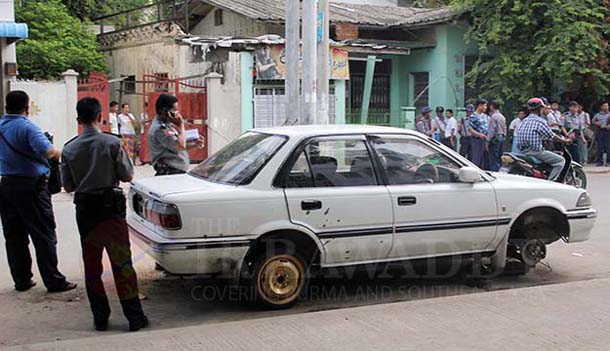MANDALAY — Nationalist Burmese monk U Wirathu has claimed that Islamic terrorists are behind a bomb blast that took place during a Dhamma sermon he was conducting that injured at least five Buddhist devotees on Sunday night.
“I think the culprit might be the Islamic extremists and the terrorists,” he told The Irrawaddy, adding that a video titled “Mohamed is now asking for Wirathu and Pyinnyarwara. Who will bring them?” was being spread in Mandalay, with a message against U Wirathu, fellow monk U Pyinnyarwara and the Buddhist nationalist movement that the two support.
“Since their plan to fight me via Time magazine has failed, they are now targeting my Dhamma events and the devotees with explosive devices,” U Wirathu said, referring to a Time article in the magazine’s July issue that took a critical tone toward Wirathu’s teachings and labeled him “The Face of Buddhist Terror.”
Shortly after the sermon began on Sunday, an explosion startled those in attendance, about two-thirds of whom proceed to exit the venue in fear. The sermon proceeded nonetheless, with local police guarding the site following the blast.
“I feel no fear and will not keep a security detail with me because I’m not a special person. I will continue with what I must do but have to condemn this action, as this is affecting the devotees and peace,” he added.
Soe Nyein, a superintendent of the Mandalay divisional police, said U Wirathu’s assertion was premature.
“It is too early to say that the perpetrators were Islamic terrorists,” he told The Irrawaddy, adding that he was not at liberty to elaborate on the investigation, which is ongoing.
Wirathu is a leader of the 969 movement, which encourages Buddhists in Burma to support fellow Buddhists and boycott Muslim-owned businesses. Among other anti-Muslim positions espoused by the movement’s supporters, 969 followers say Burma’s minority Muslims, who make up about 5 percent of the population, threaten to one day overtake Buddhists as the demographic majority. Some 90 percent of Burma’s people are currently followers of Buddhism.
Sunday’s incident comes just as a period of increased activity among Burma’s Buddhist community kicks off.
“Since Buddhist Lent is starting, there will be many religious ceremonies and Dhamma sermons from prominent monks will be taking place every week. We are worried that devotees might not come to the ceremonies and sermons in fear of their safety. We want authorities to provide security for the monks and the devotees,” said Ko Jay, an organizer of Sunday night’s Dhamma sermon.
The exact nature of the attack is unclear, with varying accounts of the source of the explosive device. One devotee told The Irrawaddy that the bomb had fallen from above and struck a loud-speaker that was affixed above the crowd.
“It [the explosion] took place about 20 minutes from when Sayadaw [U Wirathu] began the sermon. In the area of the crowd, something fell from above with sparks and later I heard a thundering sound and saw a car was hit and its tires were on fire. Many people tried to extinguish the fire by throwing sand [on the flames]. Five people were hit by shrapnel on their legs and arms while many others returned to their homes in fear,” said Ye Htun, who attended the sermon.
According to police, the bomb was thrown into the venue, where hundreds of devotees were listening U Wirathu’s sermon.
“It was a manmade bomb that included pieces of iron, nails and wires, designed to injure many people. Luckily, the bomb did not land among the crowd and went instead under a car that was parked near the area. Five women and a young monk were hit by those pieces of iron but just have minor injuries,” said an officer from the Mandalay divisional police office.
Other reports said the explosive device was planted inside or beneath the car.
Police said they were investigating the incident and planned to provide bolstered security at Dhamma sermons and religious ceremonies, especially during Buddhist Lent, which began on Monday and lasts three months.

















